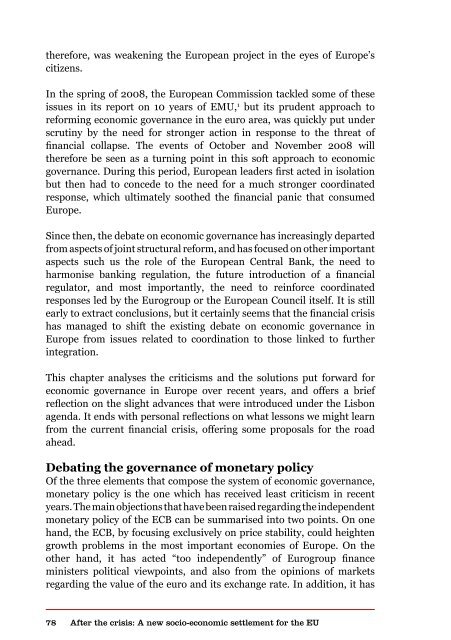Authors Iain Begg | Gabriel Glöckler | Anke Hassel ... - The Europaeum
Authors Iain Begg | Gabriel Glöckler | Anke Hassel ... - The Europaeum
Authors Iain Begg | Gabriel Glöckler | Anke Hassel ... - The Europaeum
Create successful ePaper yourself
Turn your PDF publications into a flip-book with our unique Google optimized e-Paper software.
therefore, was weakening the European project in the eyes of Europe’s<br />
citizens.<br />
In the spring of 2008, the European Commission tackled some of these<br />
issues in its report on 10 years of EMU, 1 but its prudent approach to<br />
reforming economic governance in the euro area, was quickly put under<br />
scrutiny by the need for stronger action in response to the threat of<br />
financial collapse. <strong>The</strong> events of October and November 2008 will<br />
therefore be seen as a turning point in this soft approach to economic<br />
governance. During this period, European leaders first acted in isolation<br />
but then had to concede to the need for a much stronger coordinated<br />
response, which ultimately soothed the financial panic that consumed<br />
Europe.<br />
Since then, the debate on economic governance has increasingly departed<br />
from aspects of joint structural reform, and has focused on other important<br />
aspects such us the role of the European Central Bank, the need to<br />
harmonise banking regulation, the future introduction of a financial<br />
regulator, and most importantly, the need to reinforce coordinated<br />
responses led by the Eurogroup or the European Council itself. It is still<br />
early to extract conclusions, but it certainly seems that the financial crisis<br />
has managed to shift the existing debate on economic governance in<br />
Europe from issues related to coordination to those linked to further<br />
integration.<br />
This chapter analyses the criticisms and the solutions put forward for<br />
economic governance in Europe over recent years, and offers a brief<br />
reflection on the slight advances that were introduced under the Lisbon<br />
agenda. It ends with personal reflections on what lessons we might learn<br />
from the current financial crisis, offering some proposals for the road<br />
ahead.<br />
Debating the governance of monetary policy<br />
Of the three elements that compose the system of economic governance,<br />
monetary policy is the one which has received least criticism in recent<br />
years. <strong>The</strong> main objections that have been raised regarding the independent<br />
monetary policy of the ECB can be summarised into two points. On one<br />
hand, the ECB, by focusing exclusively on price stability, could heighten<br />
growth problems in the most important economies of Europe. On the<br />
other hand, it has acted “too independently” of Eurogroup finance<br />
ministers political viewpoints, and also from the opinions of markets<br />
regarding the value of the euro and its exchange rate. In addition, it has<br />
78<br />
After the crisis: A new socio-economic settlement for the EU

















